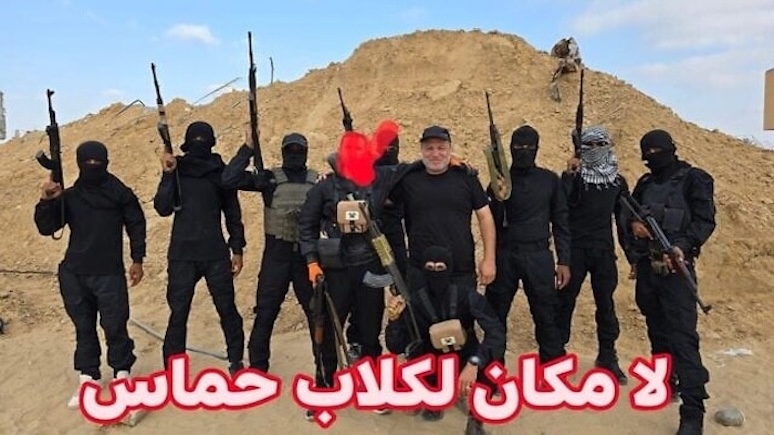


[Order Michael Finch’s new book, A Time to Stand: HERE. Prof. Jason Hill calls it “an aesthetic and political tour de force.”]
Hossam al-Attal is a Bedouin hailing from just outside Khan Younis. He used to work for the Palestinian Authority in Gaza before Hamas drove all of its operatives out of the Strip. He despises Hamas, which he accuses of having brought only misery to the people of Gaza. He has hundreds of men now in his militia, and is expecting to soon enroll another 300-400 who, like him, are prepared to beat back any challenge to his authority that Hamas, now so weakened by the IDF, might decide to mount.
More on this militia head, who is directly flouting Hamas’ authority in Khan Younis, one of Gaza’s largest cities, can be found here: “Armed group claims to set up area in Khan Younis for Gazans seeking alternative to Hamas rule,” by Nurit Yohanan, Times of Israel, September 18, 2025:
A former member of the Palestinian Authority’s security forces in Gaza says he has formed a group operating against Hamas in southern Gaza’s Khan Younis, and urges Palestinians in the area to seek safety with him.
Hossam al-Astal tells The Times of Israel that his group will take in “whoever lives under Hamas’s oppression,” and that there is enough food, water and shelter for all.
“In the coming days, we will bring in another 300-400 people,” he says, adding that the group carries out security screenings to make sure those joining have no ties to Hamas.
Al-Astal’s group has established itself around the village of Kizan al-Najjar, just south of Khan Younis, which was emptied of its residents during the war. The location is about a kilometer from al-Mawasi, where Israel has directed Palestinians displaced from Gaza City.
IDF troops are right next door to al-Astal’s militia, for they are keeping order in al-Mawasi, which is the safe zone the Israelis have set up for Gazans fleeing from Gaza City. They are in close communication with al-Astal, and no doubt supplying him with weapons, and also making available to his men both water and electricity, that Hamas is now incapable of supplying to its own combatants.
“I am responsible for the (new) humanitarian zone in Khan Younis,” he explains, comparing his efforts to those of Yasser Abu Shabab, whose armed gang has set up security structures and civilian infrastructure as an alternative to Hamas rule in Israeli-controlled parts of Rafah in recent months….
Yasser Abu Shabab’s group should not be described with that loaded word “gang.” It is a militia group, and like that of al-Astal, is attempting to release the residents in part of Rafah — from the despotic rule of Hamas. So far Hamas has threatened to confront Abu Shabab’s militia, but has not dared to do so; that militia is too strong in Rafah and Hamas too weak, for not only has it been battered by the IDF, but its forces are spread out over all of Gaza while Abu Shabab is only protecting his militia’s rule in one part of one city.
Al-Astal’s militia, and the people who agree to be ruled by that militia, meanwhile, will soon have water and electricity supplied by the IDF, which understands the importance of supporting these local forces in Gaza that are enemies of Hamas. Hamas has a lot of enemies who want to see its grip on Gaza loosened, and they are funding these local militias to undermine the terror group. The US, the EU, and Arab countries —no doubt that means the UAE and Saudi Arabia — are providing money to keep al-Astal’s militia afloat by paying the salaries of its members, and the IDF, next door in the “safe zone” of al-Mawasi, is supplying them with weapons.
Fiercely anti-Hamas, Hossam al-Astal is one more leader who has created his own militia to tend to the needs of the local population, and has rejected Hamas’ rule as having brought nothing but woe to the people of Gaza. He’s the second militia leader to have stepped forward to publicly challenge Hamas — the first was Yasser al-Shabab in Rafah — and to assure those he will now be responsible for that Israel will supply his followers with electricity and water. That’s an offer that will boost his militia’s membership, and secure the loyalty of those in the territory he controls. With another half-dozen such militias coming into existence to defy the terror group and to take control of parts of Gaza, Hamas may not just loosen but lose its grip altogether, and the Strip could end up as a collection of tiny city-states which, of course, would be just fine with Israel.
